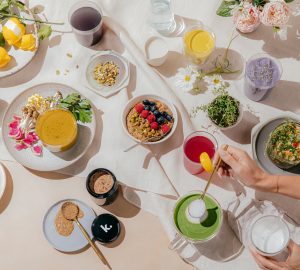Way before the Netflix documentary The Game Changers sparked seemingly endless debates around the world, plant-based diets have long been growing in popularity. However, the diet has always presented a challenge for the fitness community, with many arguments and articles on the pros and cons of different meat-free lifestyles such as vegan, pescetarian, and flexitarian.
If you’re a high-performing athlete, chances are your meals consist of large amounts of protein from lean meat, good carbs from whole grains, and plenty of vegetables. Yet, there are plenty of elite vegan athletes out there who have tailored their diet to their sporting needs.
Our post on ‘Fuelling the Vegan Athlete’ highlighted former Edmonton Oiler Georges Laraque’s transition to a pure plant-based lifestyle. Of course there will be (or in Georges’ case ‘were’) plenty of apprehensions in terms of physical performance from coaches, trainers, and even fellow athletes, but for him he chose this lifestyle due to animal rights issues rather than its health benefits.
On the ice, he was always an imposing force, which made the switch even more surprising, considering the notion that a vegan diet can lead to a loss in muscle mass. It wasn’t the case, however, as after various physical tests from both doctors and sports specialists, Georges Laraque never felt healthier and stronger than he was at that time.
Another incredible story is that of UFC fighter Nate Diaz. In Coral’s list of ‘Successful Vegan Athletes’ it notes that one of the main reasons why he stopped eating meat was that he felt it slowed him down. Diaz believes switching to a plant-based lifestyle helped him perform better in and out of the cage.
No one can argue with that, as Nate Diaz’s calling card in the Octagon is his deceptive speed and unbelievable stamina. He can even credit his vegan diet as a vital contributing factor in his 11-day preparation as a replacement fighter opposite Conor McGregor, a high-profile bout he won via submission in the second round.
But when it comes to aesthetics, self-proclaimed tofu-powered Natalie Matthews is arguably the quintessential example of a successful vegan bodybuilder. It helps that she’s also a certified vegan chef. Aside from the more common tofu, the three-time Naturally Fit Federation bikini pro recommends alternative protein sources such as tempeh, legumes, and lentils, as well as the occasional protein pasta and veggie burgers.
Natalie Matthews is living proof that achieving a certain physique on a plant-based lifestyle is possible. Popular Science’s article on ‘How to Build Muscles on a Vegan Diet’ shares the differences between the various kinds of proteins derived from plants and those that come from animals. An important takeaway in this piece is the disparity in amino acid composition, particularly leucine and lysine, between the two.
While, animal proteins typically carry more of these aforementioned amino acids than its vegan counterparts, it’s also essential to consider the efficient distribution of different types of amino acids, a specialty — for lack of a better term — of plant-based proteins.
In the end, the answer is yes, it is possible to develop a sport-specific performance on a plant-based diet. The three athletes in this article prove that. If you are thinking of trying a vegan diet but have doubts, why not follow in their footsteps?








